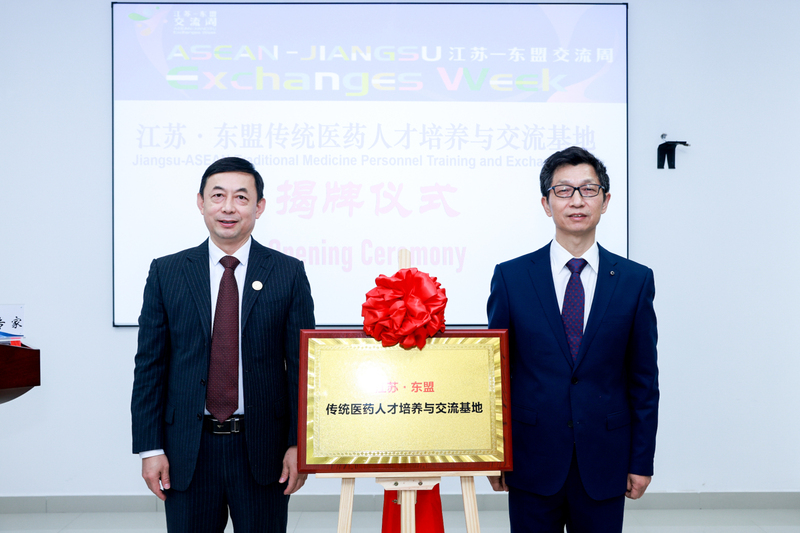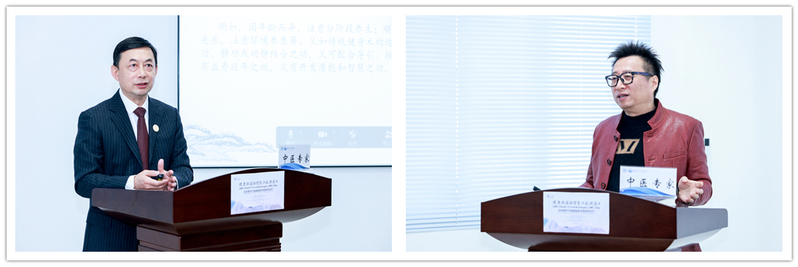

On December 17th, under the guidance of Lancang-Mekong Cooperation (LMC) China Secretariat, jointly sponsored by Jiangsu Education Department and the Foreign Affairs Office of Jiangsu Provincial People's Government, and hosted by Nanjing University of Chinese Medicine, the Lancang-Mekong Cooperation (LMC) Health Forum on Traditional Medicine in the Post Epidemic Era was held in NJUCM through a combination of online and offline methods.
The forum conducted in-depth discussions on the traditional medicine cooperation between Lancang-Mekong countries in the post-epidemic era under the vision of Belt and Road Initiative. Ms. Pasupha Chinvarasopak, Minister Counselor (Education and Technology) of the Thai Embassy in China, the head of the Lancang-Mekong Cooperation China Secretariat, Bao Guangliang, Deputy Director of the the Foreign Affairs Office of Jiangsu Provincial People's Government, and Sun Zhiguang, Vice President of NJUCM attended the forum and delivered speeches . Lancang-Mekong cooperation partners of NJUCM, representatives of Singapore and Malaysian alumni, and students of the cooperation program of Chinese medicine of Rangsit University and NJUCM also participated in the forum.
On the forum, Bao Guangliang and Sun Zhiguang jointly unveiled the Jiangsu-ASEAN Traditional Medicine Personnel Training and Exchange Base. In the post-epidemic era, the traditional medicine education cooperation between China and ASEAN will usher in a broader space for development. The Base will become an important international exchange and cooperation platform for the cultural exchange and talent training of Chinese medicine between NJUCM and ASEAN countries.

Bao Guangliang, Deputy Director of the the Foreign Affairs Office of Jiangsu Provincial People's Government, and Sun Zhiguang, Vice President of NJUCM, jointly attended the unveiling ceremony of the Base.
Bao Guangliang pointed out that Jiangsu is not only a major economic and open province in China, but also a province with the most number of masters of traditional Chinese medicine in the country. As one of the leading TCM universities in China, NJUCM has given full play to the unique advantages of traditional medicine, and has played an important role in uniting with Lancang-Mekong countries in fighting against COVID-19 and spreading epidemic prevention experience. On the 30th anniversary of the establishment of dialogue between China and ASEAN, we hope that all parties will continue to promote the Lancang-Mekong cooperation mechanis/m and carry out exchanges and cooperation in various fields of economy and trade, park construction, education, medical care and culture.

Professor Sun Zhiguang and Professor Xu Li gave lectures on TCM Regimen and Preventive Treatment of Disease Dominated by Chinese Medicine.
In recent years, NJUCM has actively responded to the Belt and Road Initiative and has cooperated with Thailand, Malaysia, Philippines, Singapore, Vietnam and other ASEAN countries to carry out educational cooperation projects at different levels of undergraduate, master, and doctoral degrees in Chinese medicine. As a State Service Export Base of Traditional Chinese Medicine, NJUCM will actively perform the functions of the WHO Collaborative Center on Traditional Medicine and the International Acupuncture Training Center, rely on overseas centers on Chinese medicine to cultivate talents of traditional medicine, build an international medical and health service platform, and develop exchanges and cooperation with ASEAN neighbors in the field of traditional medicine. NJUCM will continue to strengthen the traditional medicine education cooperation and exchange between Lancang-Mekong countries and join hands to build a closer China-ASEAN community with a shared future.




